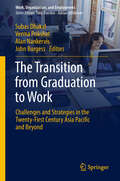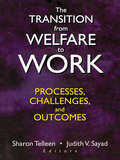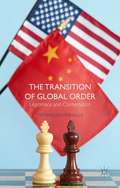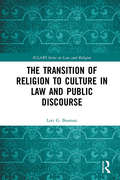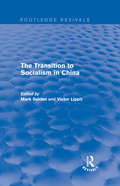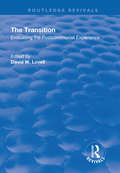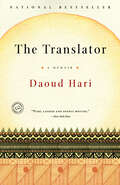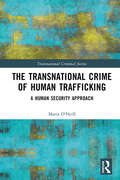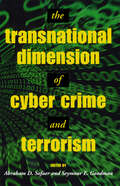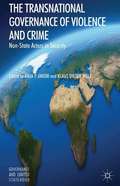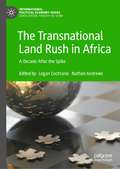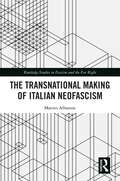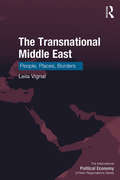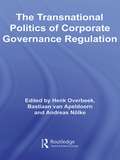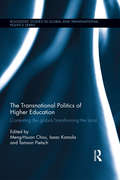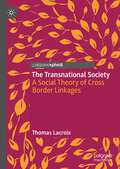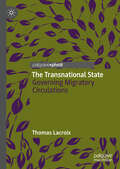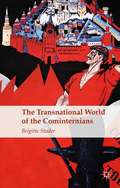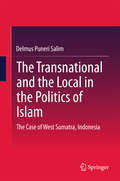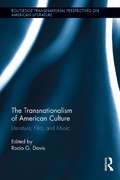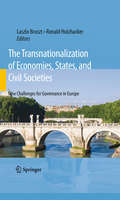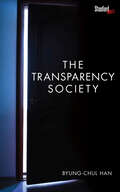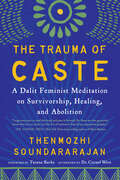- Table View
- List View
The Transit of Empire: Indigenous Critiques of Colonialism (First Peoples: New Directions in Indigenous Studies)
by Jodi A. ByrdIn 1761 and again in 1768, European scientists raced around the world to observe the transit of Venus, a rare astronomical event in which the planet Venus passes in front of the sun. In The Transit of Empire, Jodi A. Byrd explores how indigeneity functions as transit, a trajectory of movement that serves as precedent within U.S. imperial history. Byrd argues that contemporary U.S. empire expands itself through a transferable &“Indianness&” that facilitates acquisitions of lands, territories, and resources.Examining an array of literary texts, historical moments, and pending legislations—from the Cherokee Nation of Oklahoma&’s vote in 2007 to expel Cherokee Freedmen to the Native Hawaiian Government Reorganization bill—Byrd demonstrates that inclusion into the multicultural cosmopole does not end colonialism as it is purported to do. Rather, that inclusion is the very site of the colonization that feeds U.S. empire.Byrd contends that the colonization of American Indian and indigenous nations is the necessary ground from which to reimagine a future where the losses of indigenous peoples are not only visible and, in turn, grieveable, but where indigenous peoples have agency to transform life on their own lands and on their own terms.
The Transition from Graduation to Work: Challenges and Strategies in the 21st Century Asia Pacific and Beyond (Work, Organization, and Employment)
by John Burgess Subas Dhakal Verma Prikshat Alan NankervisThis book reports on the findings from a research study of vocational and higher education graduates’ employability challenges. The nature and extent of these challenges, their underlying causes, and effective strategies to address the problems in this area are all analysed from a multiple-stakeholder paradigm. The primary focus of the book is on governments; secondary, vocational, and higher education systems; and industry employers - rather than graduates themselves - in order to highlight the policy and strategy implications for governments, industry and educational systems. Readers will acquire comprehensive information on the nature and extent of graduate employability in terms of country-specific challenges, together with a deeper understanding of their complex causes, and the inter-relatedness between governments, educational systems, industry sectors, and potential employers. They will also be provided with a broad range of stakeholder strategies designed to effectively address these challenges within integrated national and regional approaches.
The Transition from Welfare to Work: Processes, Challenges, and Outcomes
by Sharon Telleen Judith V. SayadHow well do you understand the sweeping welfare reforms of the mid-1990s? The Transition from Welfare to Work: Processes, Challenges, and Outcomes provides a comprehensive examination of the welfare-to-work initiatives that were undertaken just prior to and following the major reform of United States welfare legislation in 1996. It will familiarize you with the intent of those reforms and show you how those interventions have been implemented. It also explores the barriers to employment that must be overcome by welfare-to-work clients, and the impact of these changes on clients, employers, and society. From the editors: “Although the numbers enrolled in welfare programs dropped dramatically in the last few years of the economic expansion of the 1990s, until recently we have known very little about the conditions of families affected by welfare-to-work policies. How did welfare-to-work interventions change the lives of participants and their families? What factors helped or hindered the transition to paid work? Are welfare-to-work policies likely to have actually improved the earnings or income of former AFDC recipients? This book studies all these questions.” The Transition from Welfare to Work: Processes, Challenges, and Outcomes presents qualitative, quantitative, and econometric analyses as well as panel studies, longitudinal, and quasi-experimental designs. Beginning with a brief description of the goals and structure of the Personal Responsibility and Work Opportunity Reconciliation Act of 1996, this book examines all of the phases of the welfare-to-work process. Use it to increase your understanding of: the implementation of interventions designed to place TANF recipients in jobs the factors that impact the readiness of low-income women to enter the job market the outcomes of current and earlier welfare-to-work interventions the steps we need to take to know how these citizens are faring in the welfare-to-work environment and more!
The Transition of Global Order
by Maximilian TerhalleThis study looks at the underlying foundations of global order, putting aside mainstream institutionalist approaches in showing how China and the US are engaged in an intense process of contestation and renegotiation of an institutionalized order that has long been taken for granted.
The Transition of Religion to Culture in Law and Public Discourse (ICLARS Series on Law and Religion)
by Lori G. BeamanThis book explores the recent trend toward the transformation of religious symbols and practices into culture in Western democracies. Analyses of three legal cases involving religion in the public sphere are used to illuminate this trend: a municipal council chamber; a town hall; and town board meetings. Each case involves a different national context—Canada, France and the United States—and each illustrates something interesting about the shape-shifting nature of religion, specifically its flexibility and dexterity in the face of the secular, the religious and the plural. Despite the differences in national contexts, in each instance religion is transformed into culture or heritage by the courts to justify or excuse its presence and to distance the state from the possibility that it is violating legal norms of distance from religion. The cultural practice or symbol is represented as a shared national value or activity. Transforming the ‘Other’ into ‘Us’ through reconstitution is also possible. Finally, anxiety about the ‘Other’ becomes part of the story of rendering religion as culture, resulting in the impugning of anyone who dares to question the putative shared culture. The book will be essential reading for students, academics and policy-makers working in the areas of sociology of religion, religious studies, socio-legal studies, law and public policy, constitutional law, religion and politics, and cultural studies.
The Transition to Socialism in China (Routledge Revivals)
by Mark Selden Victor LippitFirst published in 1982. The dramatic changes in policy and theory following the death of Chairman Mao in 1976 and the publication of the most extensive official and unofficial data on the Chinese economy and society in twenty years both necessitated and made possible a thorough reconsideration of the full range of issues pertaining to the political and economic trajectory of the People’s Republic in its first three decades. The contributors to this volume initiated a comprehensive effort to address fundamental problems of China’s socialist development and to reassess earlier perspectives and conclusions.
The Transition: Evaluating the Postcommunist Experience (Routledge Revivals Ser.)
by David W. LovellThis title was first published in 2002. This useful collection brings together scholars from diverse standpoints to examine the transition from Communism a decade after it began. The result is a book that illuminates the changes, and particularly the problems, that have accompanied attempts to introduce representative democracy and a viable market economy into formerly Communist states. Specialist chapters on the Former Soviet Union, Russia, Poland, Azerbaijan and the former East Germany, institutional accounts of postcommunist states and conceptual chapters result in this volume being ideally suited to university courses, policy makers and NGOs that have an interest in transition countries.
The Translator: A Memoir
by Daoud HariNATIONAL BESTSELLER • A suspenseful and deeply moving memoir that &“lays open the Darfur geocide . . . intimately and powerfully&” (The Washington Post Book World) and shows how one person can make a difference in the world. &“A book of unusually humane power and astounding moral clarity.&”—Kirkus Reviews (starred review) I am the translator who has taken journalists into dangerous Darfur. It is my intention now to take you there in this book, if you have the courage to come with me. Daoud Hari—his friends call him David—is a Zaghawa tribesman and grew up in a village in the Darfur region of Sudan. As a child he saw colorful weddings, raced his camels across the desert, and played games in the moonlight after his work was done. This traditional life shattered in 2003 when helicopter gunships appeared over Darfur&’s villages. Hari was among the hundreds of thousands of villagers attacked and driven from their homes by Sudanese-government-backed militia groups. Though Hari&’s village was burned to the ground, his family decimated and dispersed, he himself escaped, eventually finding safety across the border. Roaming the battlefield deserts on camels, he and a group of his friends helped survivors find food, water, and the way to safety. With his high school knowledge of languages, Hari offered his services as a translatorand guide after international aid groups and reporters arrived. In doing so, he risked his life again and again, for the government of Sudan had outlawed journalists in the region, and death was the punishment for those who aided the &“foreign spies.&” And then, inevitably, his luck ran out and he was captured. . . .The Translator tells the remarkable story of a young man who came face-to-face with genocide—time and again risking his own life to fight injustice and save his people.
The Transnational Crime of Human Trafficking: A Human Security Approach (Transnational Criminal Justice)
by Maria O'NeillHuman trafficking is a multi-faceted crime. It suffers from definitional and implementation problems. One facet, the focus of this book, is the transnational nature of much of the crime, and the need for practitioners to operate across borders to combat it. Europe has taken a distinctive approach to cross border law enforcement and judicial cooperation, which could be used as a model in other areas of the world. This publication examines these problems from a Council of Europe and European Union perspective, including the now post-Brexit UK. The UK has adopted a distinctive approach to legislating and operationalising its trafficking in human beings (THB) legal frameworks, also legislating for “slavery, servitude, forced and compulsory labour”, resulting in distinctive results in internal UK law enforcement. It is argued here that this approach and the results should inform THB legislative and operational developments more widely. Further action in legal and operational frameworks is, however, clearly needed and the book advocates the adoption of a human security “freedom from fear” approach. Ultimately, the interaction of different legal frameworks, and different jurisdictions requires transnational practitioners to adopt a constructivist approach, as was adopted for the development of the internal EU area of freedom, security and justice. The book will be of interest to academics, researchers and policy-makers working in the areas of transnational law, migration law, criminology and international relations.
The Transnational Dimension of Cyber Crime and Terrorism
by Abraham D. Sofaer Seymour E. GoodmanIn December 1999, more than forty members of government, industry, and academia assembled at the Hoover Institution to discuss this problem and explore possible countermeasures. The Transnational Dimension of Cyber Crime and Terrorism summarizes the conference papers and exchanges, addressing pertinent issues in chapters that include a review of the legal initiatives undertaken around the world to combat cyber crime, an exploration of the threat to civil aviation, analysis of the constitutional, legal, economic, and ethical constraints on use of technology to control cyber crime, a discussion of the ways we can achieve security objectives through international cooperation, and more. Much has been said about the threat posed by worldwide cyber crime, but little has been done to protect against it. A transnational response sufficient to meet this challenge is an immediate and compelling necessity—and this book is a critical first step in that direction.
The Transnational Governance of Violence and Crime
by Anja P. Jakobi Klaus Dieter WolfBuilding upon a range of case studies that range from civil war to maritime security and cyber crime, the contributors analyse how non-state actors can and should be involved in contributing to state and human security.
The Transnational Land Rush in Africa: A Decade After the Spike (International Political Economy Series)
by Nathan Andrews Logan CochraneThis volume provides up-to-date information on what has happened in the African ‘land rush’, providing national case studies for countries that were heavily impacted. The research will be a critical resource for students, researchers, advocates and policy makers as it provides detailed, long-term assessments of a broad range of national contexts. In addition to the specific questions of land and investment, this book sheds light on the broader international political economy of development in different African countries.
The Transnational Making of Italian Neofascism (Routledge Studies in Fascism and the Far Right)
by Matteo AlbaneseThis book delves into the evolution of Italian neo-fascism from the end of World War II to the mid-1970s.It examines the transition from historical fascism to neo-fascism, highlighting the survival and adaptation of fascist ideologies within democratic frameworks. This book explores the formation and development of the Italian Social Movement (MSI) and the broader neo-fascist network, emphasising its transnational connections and ideological persistence. Key themes include the escape and reorganisation of former fascists, their influence on post-war Italian politics, and the cultural and ideological debates within the neo-fascist movement. The work also addresses the role of race, anti-communism, and the strategic alliances formed during the Cold War. By tracing the historical and ideological continuities, this book provides a comprehensive understanding of neo-fascism's enduring impact on Italian and global political landscapes.It will be of interest to students and scholars of fascism, political history, and Italian politics.
The Transnational Middle East: People, Places, Borders (New Regionalisms Series)
by Leïla VignalThe Middle East has been undergoing new crises since the powerful socio-political uprisings known as the Arab Spring took place in several countries in 2011. Some countries are experiencing a long-term collapse of their political and social structures out of internal conflicts and external interventions. The Transnational Middle East posits that, in the Middle East, the development of regional dynamics, of processes and circulations of all kinds, can be documented. In this regard, the approaches it develops — ‘bottom-up’ regionalisation, ‘globalisation from below’ — allow for a better understanding of the ways in which the Middle East is part of global transformations. The book analyses how, through their practices, Middle East societies elaborate a regional space which is not institutionalised. Based on fieldwork in the Middle East, the book provides venues for further theoretical elaboration on globalisation and contemporary societies, as well as on processes of regionalisation. It draws on the emergence of genuine regional spaces of culture, art, economic activity, human circulation — which supplement and do not contradict other infra-national, national, or global social processes. As in other areas of the world, these transformations are to a large extent the mode of the Middle East’s insertion into globalisation. In this respect, they go against standard narratives of the supposed ‘exceptionalism’ of the region. This book will be a great contribution to comparative politics, Middle Eastern studies, globalisation and international relations.
The Transnational Politics of Corporate Governance Regulation (RIPE Series in Global Political Economy #Vol. 23)
by Andreas Nölke Henk Overbeek Bastiaan Van ApeldoornThis ambitious volume explores the politics of recent changes in corporate governance regulation and the transnational forces driving the process. Corporate governance has in the 1990s become a catchphrase of the global business community. The Enron collapse and other recent corporate scandals, as well as growing worries in Europe about the rise of Anglo-Saxon finance, have made issues of corporate governance the subject of political controversies and of public debate. The contributors argue that the regulation of corporate governance is an inherently political affair. Given the context of the deepening globalization of the corporate world, it is also increasingly a transnational phenomenon. In terms of the content of regulation the book shows an increasing reliance on the application of market mechanisms and a tendency for corporations themselves to become commodities. The emerging new mode of regulation is characterized by increasing informalization and by forms of private regulation. These changes in content and mode are driven by transnational actors, first of all the owners of internationally mobile financial capital and their functionaries such as coordination service firms, as well as by key public international agencies such as the European Commission. The Transnational Politics of Corporate Governance Regulation will be of interest to students and researchers of international political economy, politics, economics and corporate governance.
The Transnational Politics of Higher Education: Contesting the Global / Transforming the Local (Routledge Studies in Global and Transnational Politics)
by Tamson Pietsch Meng-Hsuan Chou Isaac KamolaThis edited volume introduces readers to the relationship between higher education and transnational politics. It shows how higher education is a significant arena for regional and international transformation as well as domestic political struggle replete with unequal power relations. This volume shows: The causes and impacts of recent transformations in higher education within a transnational context; Emerging similarities in objectives, institutional set-ups, and approaches taking place within higher education institutions across different world regions; The asymmetrical relations between various kinds of institutional, commercial and state actors across borders; The extent to which historical and colonial legacies are important in the transformation of higher education; The potential effects these developments have on the current structure of international political order. Drawing on case studies from across the Middle East, Asia, Africa, Latin America, and Europe, the contributors develop diverse perspectives explaining the impact of transnational politics on higher education—and higher education on transitional politics—across time and locality. This book is among the first multi-disciplinary effort to wrestle with the question of how we can understand the political role of higher education, and the political force universities exert in the realm of international relations.
The Transnational Society: A Social Theory of Cross Border Linkages
by Thomas LacroixThis book is the first of a work in two parts addressing the relations between the transnational society and the state. It is dedicated to the analysis and conceptualisation of transnational societies. This work moves beyond the mere depiction of transborder socialities by shedding light on the fundamental structures underpinning them. It investigates the mechanics of their formation and evolution, their demise or transformation into diasporas. It theorises transmigrants as plural humans embedded and socialised in multiple settings, and whose activities are sustained and framed by three key social institutions: transnational families, businesses and associations. It sheds light on the construction of an intersubjective moral framework regulating the relations between migrants and non-migrants. Finally, it examines the space-time continuum of transnational societies.
The Transnational State: Governing Migratory Circulations
by Thomas LacroixThis work in two parts examines the relations between transnational societies and states. The second volume of this work contends that current policies meant to control or enhance transnational flows have led to the emergence of a transnational policy apparatus coined the transnational state. This book proposes an innovative conceptual framework to grasp the transformations of the contemporary state in both sending and receiving countries. It shows how states expand beyond national territorial limits by reaching out to migrants where they are. In response to the migrants’ endeavours to circumvent the constrains imposed by selective migration policies, public authorities expand the reach of their control beyond (externalisation), within (internalisation) and at (expansion) borders. A totalitarian temptation seems to have seized contemporary state bureaucracies, affecting the very nature of borders and societies. The core argument of this research is that the development of the transnational state is not random. It is a process shaping and shaped by the structures of the transnational society.
The Transnational World of the Cominternians
by Brigitte StuderThe 'Cominternians' who staffed the Communist International in Moscow from its establishment in 1919 to its dissolution in 1943 led transnational lives and formed a cosmopolitan but closed and privileged world. The book tells of their experience in the Soviet Union through the decades of hope and terror.
The Transnational and the Local in the Politics of Islam
by Delmus Puneri SalimThis book explores the relationship between transnational and local Islam as expressed in public discourse and policy-making, as represented in the local press. It does so against the background of local governments in majority Muslim regions across Indonesia promoting and passing regulations that mandate forms of social or economic behaviour seen to be compatible with Islam. The book situates the political construction of Islamic behaviour in West Sumatra, and in Indonesia more generally, within an historical context in which rulers have in some way engaged with aspects of Islamic practice since the Islamic kingdom era. The book shows that while formal local Islamic regulations of this kind constitute a new development, their introduction has been a product of the same kinds of interactions between international, national and local elements that have characterised the relationship between Islam and politics through the course of Indonesian history. The book challenges the scholarly tendency to over-emphasise local political concerns when explaining this phenomenon, arguing that it is necessary to forefront the complex relationship between local politics and developments in the wider Islamic world. To illustrate the relationship between transnational and local Islam, the book uses detailed case studies of four domains of regulation: Islamic finance, zakat, education and behaviour and dress, in a number of local government areas within the province.
The Transnationalism of American Culture: Literature, Film, and Music (Routledge Transnational Perspectives on American Literature)
by Rocío G. DavisThis book studies the transnational nature of American cultural production, specifically literature, film, and music, examining how these serve as ways of perceiving the United States and American culture. The volume’s engagement with the reality of transnationalism focuses on material examples that allow for an exploration of concrete manifestations of this phenomenon and trace its development within and outside the United States. Contributors consider the ways in which artifacts or manifestations of American culture have traveled and what has happened to the texts in the process, inviting readers to examine the nature of the transnational turn by highlighting the cultural products that represent and produce it. Emphasis on literature, film, and music allows for nuanced perspectives on the way a global phenomenon is enacted in American texts within the U.S, also illustrating the commodification of American culture as these texts travel. The volume therefore serves as a coherent examination of the critical and creative repercussions of transnationalism, and, by juxtaposing a discussion of creativity with critical paradigms, unveils how transnationalism has become one of the constitutive modes of cultural production in the 21st century.
The Transnationalization of Economies, States, and Civil Societies
by Ronald Holzhacker Laszlo BrusztTwo decades after the fall of the Berlin Wall, we are witnessing an ever quickening dissolution of the boundaries between internal and external actors and the critical factors for understanding domestic institutional change. In the transnationalization of the economies of Western and Eastern Europe, international cross-ownership networks are playing a growing, and at times dominant role in domestic economies. These economies are governed by states that are increasingly sharing larger and larger parts of their regulative powers with non-domestic actors. These regulations are contested by civil societies that are increasingly based on networks of interlinked domestic and external NGOs. This is an emerging research agenda extending earlier research on transnationalization, which focused on the supra-national level, and it goes beyond the Europeanization literature that focused on externally induced or imposed change in domestic institutions. This book brings together in one volume the study of transnationalization in three institutional fields: civil society, state and the economy and extends the research of processes of transnationalization to evolving new democracies and emerging market economies. This book should be of interest to scholars and students in the field of political science, public policy, European studies, and international relations.
The Transparency Society
by translated by Erik Butler Byung-Chul HanTransparency is the order of the day. It is a term, a slogan, that dominates public discourse about corruption and freedom of information. Considered crucial to democracy, it touches our political and economic lives as well as our private lives. Anyone can obtain information about anything. Everything--and everyone--has become transparent: unveiled or exposed by the apparatuses that exert a kind of collective control over the post-capitalist world. For transparency has a dark side that, ironically, it has everything to do with a lack of mystery, shadow, and nuance. Behind the apparent accessibility of knowledge lies the disappearance of privacy, homogenization, and the collapse of trust. The anxiety to accumulate ever more information does not necessarily produce more knowledge or faith. Technology creates the illusion of total containment and constant monitoring of information, but what we lack is adequate interpretation of the information. In this manifesto, Byung-Chul Han denounces transparency as a false ideal, the strongest and most pernicious of our contemporary mythologies.
The Transparent Traveler: The Performance and Culture of Airport Security
by Rachel HallAt the airport we line up, remove our shoes, empty our pockets, and hold still for three seconds in the body scanner. Deemed safe, we put ourselves back together and are free to buy the beverage we were prohibited from taking through security. In The Transparent Traveler Rachel Hall explains how the familiar routines of airport security choreograph passenger behavior to create submissive and docile travelers. The cultural performance of contemporary security practices mobilizes what Hall calls the "aesthetics of transparency." To appear transparent, a passenger must perform innocence and display a willingness to open their body to routine inspection and analysis. Those who cannot--whether because of race, immigration and citizenship status, disability, age, or religion--are deemed opaque, presumed to be a threat, and subject to search and detention. Analyzing everything from airport architecture, photography, and computer-generated imagery to full-body scanners and TSA behavior detection techniques, Hall theorizes the transparent traveler as the embodiment of a cultural ideal of submission to surveillance.
The Trauma of Caste: A Dalit Feminist Meditation on Survivorship, Healing, and Abolition
by Thenmozhi SoundararajanInstant Amazon Best Seller and Hot New ReleaseFor readers of Caste and Radical Dharma, an urgent call to action to end caste apartheid, grounded in Dalit feminist abolition and engaged Buddhism.&“Dalit&” is the name that we chose for ourselves when Brahminism declared us &“untouchable.&” Dalit means broken. Broken by suffering. Broken by caste: the world&’s oldest, longest-running dominator system...yet although &“Dalit&” means broken, it also means resilient. Caste—one of the oldest systems of exclusion in the world—is thriving. Despite the ban on Untouchability 70 years ago, caste impacts 1.9 billion people in the world. Every 15 minutes, a crime is perpetrated against a Dalit person. The average age of death for Dalit women is just 39. And the wreckages of caste are replicated here in the U.S., too—erupting online with rape and death threats, showing up at work, and forcing countless Dalits to live in fear of being outed. Dalit American activist Thenmozhi Soundararajan puts forth a call to awaken and act, not just for readers in South Asia, but all around the world. She ties Dalit oppression to fights for liberation among Black, Indigenous, Latinx, femme, and Queer communities, examining caste from a feminist, abolitionist, and Dalit Buddhist perspective--and laying bare the grief, trauma, rage, and stolen futures enacted by Brahminical social structures on the caste-oppressed. Soundararajan&’s work includes embodiment exercises, reflections, and meditations to help readers explore their own relationship to caste and marginalization—and to step into their power as healing activists and changemakers. She offers skills for cultivating wellness within dynamics of false separation, sharing how both oppressor and oppressed can heal the wounds of caste and transform collective suffering. Incisive and urgent, The Trauma of Caste is an activating beacon of healing and liberation, written by one of the world&’s most needed voices in the fight to end caste apartheid.

